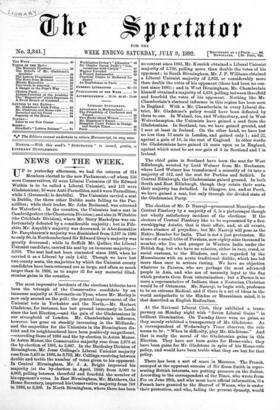The most impressive incidents of the elections hitherto have been
the triumph of the Conservative candidate by an immense majority at Newcastle-on-Tyne, where Mr. Morley is now only second on the poll ; the general improvement of the Unionist vote in Yorkshire and the North,—Mr. Herbert Gladstone, for instance, has lost ground immensely in Leeds since the last Election,—and the gain of the Gladstonians in our stronghold of London. Mr. Chamberlain's influence, however, has gone on steadily increasing in the Midlands ; and the majorities for the Unionists in the Birmingham dis- trict and its neighbourhood have been positively magnificent, —exceeding those of 1886 and the by-election in Aston Manor. In Aston Manor, the Conservative majority rose from 2,978 at the by-election of 1891, to 3,987. In the Bordesley Division of Birmingham, Mr. Jesse Collings's Liberal Unionist majority rose from 3,435 in 1886, to 3,722, Mr. Collings receiving between double and treble the number of votes given to his opponent. In Central Birmingham, Mr. J. A. Bright improved his majority (at the by-election in April, 1889) from 3,060 to 4,003, polling between threefold and fourfold the number of his opponent's votes. In East Birmingham, Mr. Matthews, the Home Secretary, improved his Conservative majority from 789 in 1886, to 2,209. In North Birmingham, where there has been no contest since 1885, Mr. Kenrick obtained a Liberal Unionist majority of 2,730, polling more than double the votes of his opponent; in South Birmingham, Mr. J. P. Williams obtained a Liberal Unionist majority of 2,923, or considerably more than double the votes of his opponent (there had been no con- test since 1885) ; and in West Birmingham, Mr. Chamberlain himself obtained a majority of 4,418, polling between threefold and fourfold the votes of his opponent. Nothing like Mr. Chamberlain's electoral influence in this region has been seen in England. With a Mr. Chamberlain in every Liberal dis- trict, Mr. Gladstone's policy would have been defeated by three to one. In Walsall, too, and Wednesbury, and in West Wolverhampton, the Unionists have gained a seat from the Gladstonians. In Scotland, too, we have gained ground, and 1 seat at least in Ireland. On the other hand, we have lost no less than 13 seats in London, and gained only 1; and 22, against a gain of 10, in the rest of England. In other words. the Gladstonians have gained 24 seats upon us in England, against which must be set our gain of 3 in Scotland and 1 in Ireland.


















































 Previous page
Previous page